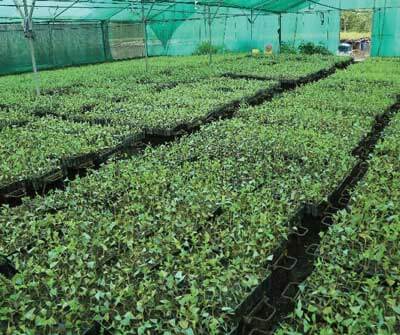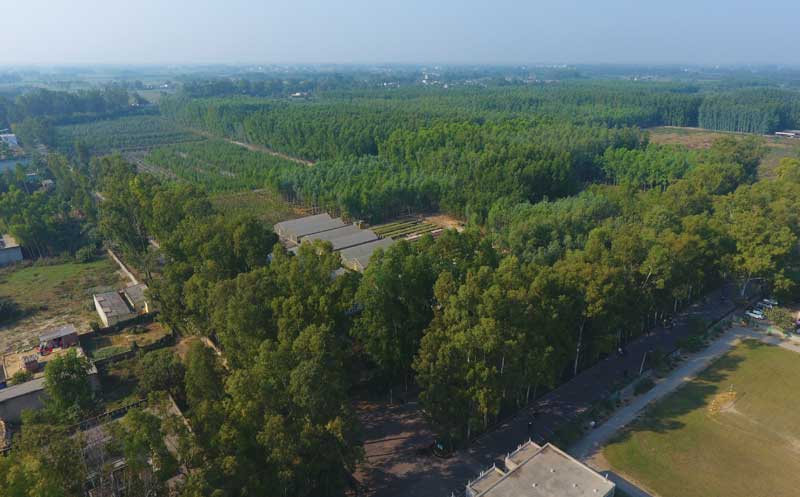“Since 2008, we have constantly worked on upgrading our own Clonal Propagation Centre (CPC), which now has a production capacity of around 10 lakh saplings per annum,” says Mr. Pavan Khaitan, Managing Director, Kuantum Papers Ltd.

Kuantum Papers Ltd. is an integrated agro and wood pulp-based paper manufacturer. Since 1979, the paper mill has been producing writing and printing, copier, and specialty papers from various kinds of agricultural residues, straws, bagasse, and wood. Located in Punjab, Kuantum Papers is an environmentally conscious company and has been taking initiatives in social forestry for the past several years and promotes farm forestry in its surrounding areas. In an interview with Paper Mart, Mr. Pavan Khaitan, Managing Director, Kuantum Papers Ltd. reveals more about the company’s social and farm forestry programmes.
Paper Mart: Please tell us about your pro-afforestation schemes. How much area is covered under plantations by you?
Pavan Khaitan: The social farm forestry initiative was started at Kuantum Papers Ltd. in the year 2008. Since then, we have constantly worked on upgrading our own Clonal Propagation Centre (CPC), which now has a production capacity of around 10 lakh saplings per annum. At present, we have covered 3300 acres around Hoshiarpur in Punjab while we have our own plantation spread in 110 acres within the plant premises.
PM: Tell us about the hardwood and softwood trees grown by the mill. Do you think that sourcing wood from farm forestry is a win-win situation for both mills as well as farmers who want a steady source of income?

PK: As a part of the farm forestry initiative, we produce Eucalyptus clonal saplings and distribute the same at very nominal prices amongst the farmers of the surrounding areas. Our plantation team also educates the farmers about inter-cropping, soil preparation, alignment and spacing of saplings and optimum irrigation levels to ensure that they have a good yield.
From the paper mills’ perspective, farm forestry provides a sustainable source of raw material, which in present times, is a major area of concern. From the farmers’ point of view, they get an additional source of income from the same parcel of land and their risks are also reduced due to crop diversification. This is an additional income source for the farmers, and they can earn anywhere between INR 18,000 and INR 20,000 per annum per acre of land. Thus, farm forestry is truly a win-win strategy for the paper industry as well as the farmer community.
“We have covered 3300 acres around Hoshiarpur in Punjab while we have our own plantation spread in 110 acres within the plant premises.”
Watch: Evolution of Paper Based Packaging
PM: Do you think that India’s agroforestry policy is a step in the right direction? How do you think the recent announcement of policies and legislative changes to promote agroforestry and private forestry in Budget 2022 will help?
PK: The announcement of the agroforestry policy in budget 2022 is a shot in the arm for the pulp & paper Industry. The industry is passing through challenging times in terms of constraints in the availability of wood raw materials. The promotion of agroforestry in the huge reserves of available degraded land which can easily be afforested is indeed a step in the right direction by the government.
During budget 2022, the Finance Minister, in her speech, has allowed agroforestry in 25 lakh hectares of land, which shall go a long way in ensuring raw material security for all the wood-based industries. For the last many years, the paper industry has already done plantations on 12 lakh hectares of land. Policies and legislative changes to promote agroforestry in additional 25 lakhs hectares of land shall provide employment to at least 10-15 lakhs persons, supplement the income of farmers, increase the country’s green cover, provide environmental benefits and also generate raw material for all the wood-based industries at competitive rates.
PM: Have you been able to improve the productivity of degraded lands, control soil erosion, and push moisture conservation through your social farm forestry program?
PK: We constantly educate the farmers on the management of soil fertility to ensure adequate availability of micronutrients, moisture conservation measures and optimum irrigation. Many of the farmers who connected through our plantation program have reported an improvement in the soil quality and thus an overall improvement in the productivity of their lands.

Also Read: Getting Greener Forestry Practices of Paper Mills
PM: What are your company’s future targets in farm forestry?
PK: We plan to expand our clonal saplings production to 1 crore saplings per annum in the next 5 years to promote and support our farm forestry Initiative. Further, we are also strengthening our plantation team so that the reach of our farm forestry program becomes wider and we are able to connect with more farmers at the grass-root level.



